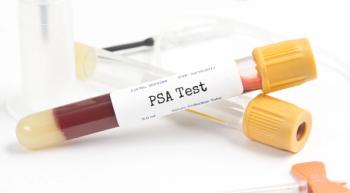
With new immune checkpoint inhibitors being utilized in treating patients with ICC, physicians need to study new ways to address irAEs associated with this treatment.


With new immune checkpoint inhibitors being utilized in treating patients with ICC, physicians need to study new ways to address irAEs associated with this treatment.

Genetic testing in cancer care is a relatively new element of the field, but some experts are looking to it to help prevent and understand prostate cancer in racially diverse populations.

Results from the phase III CARD trial suggest positive outcomes for patients with advanced prostate cancer on a novel treatment chemotherapy combination therapy treatment.

While the findings from the most recent CARD study prove promising, it's the toxicity results that have one expert excited.


For patients with advanced prostate cancer, new findings from the CARD trial could change their daily treatment.



In 2019, 18,000 patients will die from metastatic urothelial cancer, but a new priority review recently granted to enfotumab vedotin shows promise for future treatment of patients with the disease.

The genitourinary cancer space has seen a lot of updates in the past 5-10 years, but where are they all coming from so suddenly? Oncology Nursing News spoke with Michael Lai, ARNP, a nurse practitioner at Seattle Cancer Care Alliance, about how the genitourinary cancer space has been able to have so many updates recently.

Can combining agents turn "cold" prostate cancer tumors "hot"?

The FDA has granted a priority review designation to a supplemental new drug application for enzalutamide (Xtandi) for the treatment of men with metastatic hormone-sensitive prostate cancer (mHSPC), according to Astellas Pharma Inc. and Pfizer Inc., the codevelopers of the androgen receptor inhibitor.

Nurses must stay up to date with the fast-moving world of bladder cancer.

The FDA has approved darolutamide (Nubeqa) for the treatment of patients with nonmetastatic castration-resistant prostate cancer.

Several key abstracts presented at the 2019 ASCO Annual Meeting demonstrated practice-changing potential in the prostate cancer field, said Celestia S. Higano, MD, FACP.

A pediatric oncology nurse’s experience came full circle following her own bladder cancer diagnosis, followed by serving as a caregiver to her husband who faced the same disease 6 years later.

Liquid biopsies and other novel techniques have the potential to change the bladder cancer space. However, unanswered questions remain.

Switch maintenance treatment with pembrolizumab (Keytruda) improved progression-free survival (PFS) in patients with metastatic urothelial cancer who have stable disease following frontline platinum-based chemotherapy, according to results of a randomized phase II study that were presented at the 2019 ASCO Annual Meeting.

The Food and Drug Administration approved bevacizumab-bvzr (Zirabev) – a biosimilar for bevacizumab (Avastin) for the treatment of metastatic colorectal cancer; unresectable, locally advanced, recurrent or metastatic NSCLC; recurrent glioblastoma; metastatic renal cell carcinoma; and persistent, recurrent or metastatic cervical cancer.

Healthcare providers should not base cancer care with immune checkpoint inhibitors on gender, according to recent study findings.

There may be a correlation between androgen deprivation therapy and cardiac complications, but more research is still needed.

Nurses now have a wealth of new and updated resources to ensure their patients with prostate cancer can make the best treatment choices they can, thanks to the Prostate Cancer

Two new urine tests currently being investigated for bladder cancer detection and monitoring have demonstrated more than 90% sensitivity and specificity – highlighting the potential for addressing an unmet need among this patient population.

The FDA approved the combination use of avelumab plus axitinib for the first-line treatment of patients with advanced renal cell carcinoma.

When it comes to the treatment of patients with nonmetastatic castration-resistant prostate cancer (M0CRPC), 3 pivotal trials—SPARTAN, PROSPER, and most recently, ARAMIS—have demonstrated the safety and efficacy of second-generation targeted antiandrogens, said Richard (Rick) JaeBong Lee, MD, PhD.